I just got another Siberian Husky puppy (Lara) about 10 days ago and am going through a puppy training refresher course. Indeed, it is easy to forget how much work a new puppy truly is.
Therefore, I have decided to write this article of the first 10 puppy days while it is still fresh in my mind. The next time I even think of getting a puppy, I can re-read this article and hopefully remember what a big pain in the ass a new puppy is! 😀

Days 1 & 2 – Nights from Hell
The first few days were not too bad. We mainly focused on introducing puppy to our other two dogs and making sure that our existing dogs saw puppy as a positive thing.
We also started on puppy potty training but puppy seemed to have that under good control. We did not have any mistakes – it was amazing!
However, puppy did cry at night. This is not surprising since it is the first time she is sleeping in a new location and without her litter mates. Puppy was feeling lonely, sad, and scared. The first couple of nights I had to wake up about 4 times. 2 times to take puppy out for potty, and another 2 times just to cuddle with puppy.
As a result I did not get much, if any sleep. Be prepared to get very little sleep in the first few weeks with a new puppy.
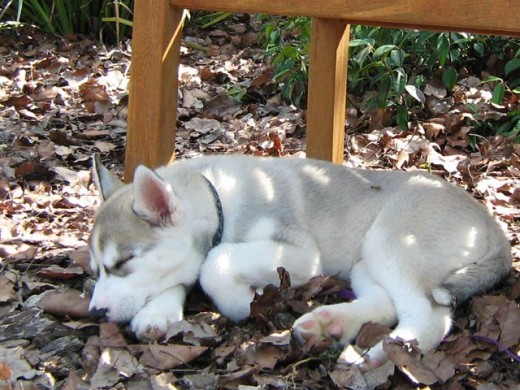
Days 3 & 4 – Puppy Potty Training Hell
The first few good potty training days lulled me into a false sense of security. On day 3 puppy made lots of mistakes all over the place.
I was around to supervise puppy the whole time, but I thought it would be ok to take short bathroom breaks while puppy was sleeping – WRONG!
I found out the hard way that constant supervision is absolutely necessary for potty training in order to prevent potty mistakes.
When I need to go to the bathroom or perform some other task, I now always put puppy in her play-pen or enclosure. There is a blanket, some toys, and puppy pads in the enclosure. This makes things a lot better because puppy either does her potty outside or on her puppy pads. I reward her for going outside, but I don’t reward her for going on her puppy pads.
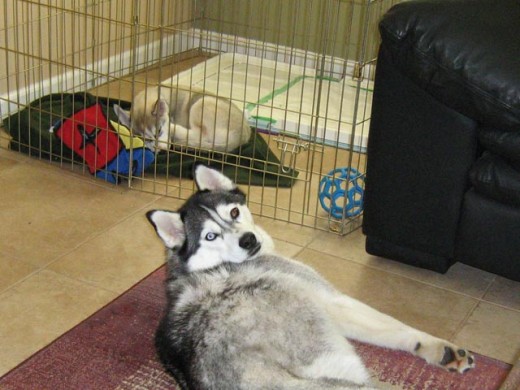
I take puppy outside –
- As soon as puppy wakes up.
- After puppy feeding time.
- After play or any other heavy activity.
- Whenever it looks like she is about to potty, e.g. circling, pulling to go to corners, etc. Each puppy will have their own potty signs, so observe carefully to identify our puppy’s pre-potty behaviors.
If puppy tries to go inside the house, I am right there next to her so that I can non-mark her (Ack-Ack), interrupt her, and leave her in her enclosure to finish up. This allows me to quickly go back and clean up the mess while she is in her enclosure.
Constant vigilance and a fixed eating and drinking schedule are crucial in puppy potty training.
Day 5 – Puppy and Furniture Hell
On day 5 I nearly had a heart attack.
Puppy was sleeping nicely with me on the couch, when I started getting really hungry. The kitchen is in the next room, so I quickly stepped away to get a loaf of bread from the refrigerator – WRONG!
As soon as I got the bread, I hear this loud cry. I threw the bread on the kitchen counter and ran back to a crying puppy on the floor. She was holding one of her front legs up in pain.
Bad, bad ShibaShake!
Luckily, puppy was ok and was moving around without any sign of a limp within the next few minutes. Whew.
From then on, I am always with puppy. If I cannot be with puppy even for 1 second, she goes into her puppy enclosure.

Days 6 to 9 – Energizer Puppy Hell
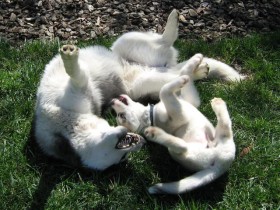
At this point, puppy is a lot more comfortable with her new surroundings and is always up to something. It is tiring as hell to try and keep up with a hyper puppy.
In the beginning, I figured that my other two dogs can take up some of the slack. I was hoping that they would all play, have a lot of chasing and running goodness, and at the end of the day I would end up with 2 tired dogs and 1 tired puppy.
Indeed it worked out well at first. I supervised all play sessions and both my dogs played well with puppy. I stepped in as soon as things got too excited, and the dogs started getting too rough with puppy.
Things were looking up because puppy not only tired out Shiba Sephy, but she also conked out Husky Shania who is a big time Energizer Bunny herself. All I needed to do was stand around and step in at the appropriate times.
WRONG!
On day 9, Shiba Sephy ran over puppy before I could get to them and stop play. Puppy started crying, and was limping for the rest of the day.
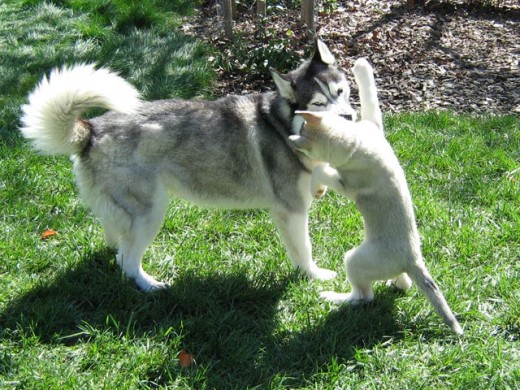
Day 10 – Puppy in Vet Hell
On day 10, puppy was still limping so we took her to the vet.
It was fun, fun, fun – with temperature taking and various poking and prodding of body parts. Then, the vet had to put puppy’s leg through a series of pretty heavy handling.
Puppy was not happy.
$343 later, we had a conked out and unhappy puppy, with a sprained rear leg.
Thank goodness it wasn’t anything more serious, but no more off-leash play until puppy gets bigger.
To close, I feel it is only fair to say that there are also many reasons to get a puppy. But … they require a lot of time, supervision, and energy to care for especially in the first few months.
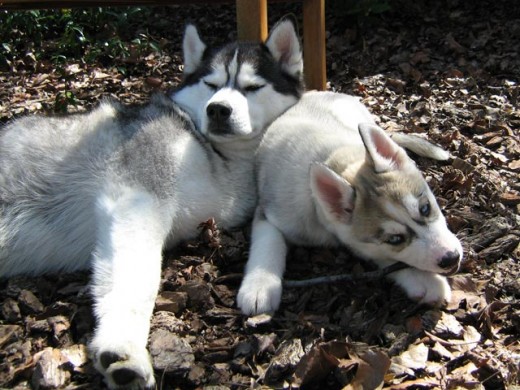
Update
Day 12 – Puppy slept through the whole night without waking up. Hopefully there will be more such nights in the future.
Day 14 – Puppy’s limp is all gone. She now has free and good use of her rear leg. YAY!
Hi! I’ve been reading your website for some time now– it’s really been helping me through the throes of having a puppy on my own. I grew up with an average of seven dogs cavorting in my grandpapa’s yard so I thought taking on a puppy would be easy… Little Tasha has proved to both my roommate and me that this would not be the case. 😛
Tasha, my roommate’s puppy, is a husky mix, which is what made me first start reading your website. She had a pretty standard first week when we brought her home, minus the crying at night (she’s a brave one). Now that she’s about 4 months old, my roommate and I find ourselves with yet another puppy on our hands. Vic is mostly my dog, and he’s a 10 week old german shepherd/lab mix who is the friendliest little thing I’ve met. Here’s the problem– Tasha just loves him a little bit too much. She’ll follow him around, her butt wiggling like crazy, sniff him everywhere, lick his face, and start play biting him and jumping at him non-stop. Vic is more of a cuddler, so he freaks out and comes running to me to be lifted up. When Tasha is being too rough or too hyper (which is always) Vic even snaps or snarls at her. Tasha doesn’t really take him seriously, though, and just resumes trying to play with him.
I’m great friends with my roommate, and we both want our puppies to grow close. But with Tasha constantly wanting to play and Vic being a little cowed by her, we’re worried that Vic might grow to fear all other dogs or even develop behavioral issues. For now we’ve let them sort it out by themselves, but should we intervene in the future? It’s been only a few days since Vic has been with us, so will he be less skittish and more willing to play with Tasha once he settles in?
Thank you so much! Your dogs are all so beautiful. 🙂
Congratulations on your new puppies! 😀
With my dogs, I set up a fixed schedule and clear dog-to-dog interaction rules. I supervise play-sessions very closely, especially in the beginning, to teach everyone the rules and make sure that everyone follows them. As soon as I notice any anti-social behavior, I redirect my dogs so that things do not escalate. I make sure that nobody gets overwhelmed. If a dog has had enough, I make sure he can go rest without being bothered.
A fixed schedule and consistent rules help my dogs understand exactly what they can expect from each other, what they can expect from me, and what I expect from them in return. This creates certainty, and certainty helps to reduce stress and conflicts.
In general, I want to minimize negative interactions and maximize positive events. In this way, my dogs learn positive social behaviors and learn to associate other dogs with fun and rewards. I set my dogs up for success by managing their environment, and I do not expose them to situations that they are not ready for.
More on how I help my dogs get along.
ASPCA article on puppy socialization-
https://www.aspca.org/pet-care/virtual-pet-behaviorist/dog-behavior/socializing-your-puppy
Hello! Just wanted to thank you for your website. I am pretty sure I have read the whole thing. lol I am a planner so it is super important for me to feel like I have as much knowledge as possible.
We are getting a Shiba puppy from a great breeder on May 8. He will be 11 weeks old. I’ve got his crate all set up in a room next to mine but, after reading your site, I am considering moving it into my room. I am confused on this point as I am usually of the mind to let him cry it out and not give in to whining as it will make the whole transition faster. I don’t want to reward whining and I feel like if he is in the room and can see me and my husband he is less likely to calm down and sleep. Perhaps I am wrong though. I’m open to suggestions. It might be useful to note that the pups are already weened and are not sleeping with their mother at night (the breeder has just recently separated them from her for bedtime). So hopefully that will help with the transition.
I have teenage boys who will be helping with his training and we also have him scheduled for puppy classes and his first vet checkup right away.
Here’s hoping that all my plans work flawlessly and Kaito (that’s his name) sticks with the program. lol (I’m being sarcastic as I know I am in for a real shock when he comes!) lol
Laura
My Shiba really likes sleeping in the bedroom with us, and still does today. 🙂 My Huskies prefer to sleep downstairs where it is cooler and they have greater freedom.
I always have a new puppy sleep with me, at least initially, because he is in a totally new environment, with totally new people, and has just been separated from his mother and siblings. After my puppy gets used to his new surroundings and people, I let him decide which he prefers. Sephy slept in a crate in our bedroom in the beginning, but now he gets to roam about the room freely, because he has learned to behave well.
It is true that we do not want to reward nuisance whining behavior, but dogs vocalize for a variety of reasons. Sometimes, my puppy vocalizes because he needs to go pee or poop. Other times, whining is due to fear or anxiety, in which case we *do* want to help address/alleviate the source of the anxiety. Dog behavior is complex so when trying to change behavior for my dog, I first try to identify the source of the behavior.
For me, I think that a young puppy is going to be fairly anxious, especially in the beginning, so I want to make things as safe and relaxing for him as possible. I also slowly crate train my puppy so that he learns to see his crate as a positive space. Finally, my puppy usually needs to go do potty once or twice during the night, and I can be sure that I will wake up if he is in the room with me.
As I said though, dog behavior is complex and each dog is different. Therefore, I always adjust things to suit my situation and my dog. The worst mistake I made with Sephy in the beginning, was in being too rigid in terms of following advice from others. Now, I always listen to my dog first, try to understand where his behavior is coming from, and try to see things from his point of view. 🙂
Congratulations on your upcoming Shiba puppy! It will be a lot of work, but it will also be a great experience. Enjoy and take lots of pictures. Also, the “puppy smell” is the best thing ever! Big hugs to Kaito! 😀
Hi
I just came across your blog while doing some research on how to get my puppy to sleep through the night in the crate. My mom, sister and I just adopted a 12 week old male cockapoo 3 weeks ago. We had the same situation happen that happened to you. We thought he was potty trained in the first few days! We were so happy, turns out he was about 80 percent trained because he started peeing on the carpet to get our attention. I think he’s spike peeing because he seems to do it when he’s not getting our undivided attention. He is extremely attached to my mom and it was cute for a little while but now it’s getting annoying. Anytime she leaves the room he screams for her, he likes me and my sister but not as much as my mom. Could he have seperation anxiety this fast? Also, when we leave him in the crate to go out he screams so loud you would think he was being stabbed. Again, is this normal? I haven’t trained a puppy in 15 years and forget what it’s like. The other big thing is his sleeping patterns. He sleeping in a crate next to my moms bed and every morning around 5 am he is barking to go out. So my mom takes him, he pees and poops then when it’s comes time to go back in the crate he barks until we have to yell at him. I’ll go to my moms room to calm him down but he seems to already think 5 am is his wake up time. Is this just a puppy thing?? I know my other dogs would sleep all the way through the night until at least 10 am or whenever we got up for school/work. Will he sleep through the night as he gets older? He has to poop at least twice a night and we cut his food off at 6. I know I’m throwing a lot at you but when I saw your blog I knew you could help us! The other problem is the biting. He bites everything! I know he’s playing and that’s all he knows but it needs to stop because i don’t want it to become a habit. Any tips? If you prefer to email me I left my email in the slot above. I have a lot more questions but want to give you a chance to answer a few before I go into anymore. Thank you so much!
1. Potty training
For potty training my puppy, supervision is key. I do not let my puppy roam freely until I am sure that he is fully potty trained, i.e. hasn’t made a mistake in the last month. When I didn’t supervise closely enough, is when the mistakes started happening.
http://shibashake.com/dog/puppy-potty-training-facts-and-myths
2. Screaming
What do you all do when he starts to scream? Dogs vocalize for a variety of reasons. Sometimes it is because of anxiety, warning, over-excitement, etc., or because it works. For example, if my puppy gets what he wants by screaming (attention, affection, other rewards), then he will scream more and more because it is rewarding to do so. To stop screaming behavior with my dog, I first need to identify where the behavior is coming from, whether it is from anxiety, from inadvertently rewarding the behavior, or something else.
As for leaving a puppy alone, I start by slowly desensitizing my puppy to alone time. I start with very short periods of alone time, and very slowly build my way up. I make sure to set my puppy up for success and not expose him to more than he can handle. The more panic attacks he has while being alone, the worse his anxiety symptoms will become.
http://shibashake.com/dog/separation-anxiety-dog-why-how-reduce-dog-stress#desensitize
3. Early wake-up
Dogs are crepuscular, so they are most active at dawn and dusk. My dogs wake up pretty early at around 6-7 am. I set up a very fixed schedule for my dogs. In this way, they know exactly when it is time for play, nap, etc. This helps to create certainty, which helps to reduce stress and anxiety. However, I need to make sure that this schedule properly fulfills their needs.
More on my puppy’s schedule.
4. Puppy biting
http://shibashake.com/dog/puppy-biting-how-to-stop-puppy-biting
5. Dog training & behavior information
http://shibashake.com/dog/how-i-trained-my-husky-puppy
http://shibashake.com/dog/how-dogs-learn-how-dogs-think
http://shibashake.com/dog/where-to-get-dog-training-and-dog-behavior-information
When I had problems with my Shiba puppy, I also visited with several good professional trainers, and that was helpful. Puppy socialization was also very important for my Shiba.
https://www.aspca.org/pet-care/virtual-pet-behaviorist/finding-professional-help
https://apdt.com/pet-owners/choosing-a-trainer/
https://www.aspca.org/pet-care/virtual-pet-behaviorist/dog-behavior/socializing-your-puppy
How old was your puppy when you got her? Do you think this is a pretty general timeline for most new pups at that age? Thanks!
My puppy was around 8 weeks old.
I think each puppy will be different depending on age, breed, temperament, environment, past experiences, and more. For example, with my Shiba Inu, I didn’t have to potty train him at all. He is a very clean dog, and after the first day, he knew to go to the front door and let us know when he needed to go.
However, this does not mean that all Shiba Inu puppies are easy to potty train. Pet store puppies, for example, may be more difficult to potty train because they may be caged for long periods of time, and become used to doing their business inside their cage.
I do use similar potty training techniques and puppy training techniques, but I also adapt them to suit each puppy/dog. I think that in general, puppies require quite a lot of supervision, attention, and training, therefore I make sure to prepare for that. However, the timeline will be different for each dog.
ShibaShake – Thank you so much for this article and your comments! I was at a loss about crate training my rescue 9wk puppy (border collie mix). I didn’t want him on the bed, but he would cry when I wasn’t next to him. I’ll definitely be sleeping on the floor near him now until he’s comfortable. Again, thank you thank you thank you!
Four paws up for rescuing a puppy in need. Happy New Year and big hugs to your new furry family member. 😀
My female siberian husky puppy is coming home on Dec. 23, 2014. I have 2 loving, kind cats who are sisters at 3 years old. I always leave cat’s food out along with bowl of water. How do I prevent husky from eating cat’s food?
My Huskies love food and will eat whatever they can get to. If I don’t want them to eat something, I put it out of their reach.
I don’t have any cats, so this is not something that I have had to deal with. However, cats can climb and are smaller, so some people put the cat’s food up in a place where the dog can’t reach, or use baby gates. There are also products that only allow cats access, e.g. Meowspace. I don’t know how well those work since I have never had to use one.
Another possibility is to not free feed, and to supervise during feeding time.
Congrats on your upcoming Husky puppy!
Just rescued 2 male 9 week old pups from a rescue shelter and I’m in hell. If they aren’t peeing all over the place they are crying. Won’t go in their crate and are caged but came from a very open and unsupervised environment with no feeding schedule or rules. It’s the most difficult thing I.ve done in my life. I work at home and have clients on speakerphone. It’s difficult.
Yeah, caring for two puppies at once can be very challenging.
With potty training, the key thing with my puppy is very close supervision. If I cannot supervise her for even 1 minute, I put her in a safe enclosure with puppy pads. I do not let her freely roam the house until after she is fully potty trained.
More on how I potty trained my puppy.
More on how I crate trained my puppy.
ASPCA article on crate training.
HI with my pup to keep him quiet i just place the radio next to him with low volume then tune it to a talk back station this works a treat OR try placing a candle where it cant be knocked oner or reached by the pup but also near it this works a treat too
Hi Shibashake,
Am just amazed at how you have managed to handle and training your pups without being a professional. I just bought 18weeks old cross pomeranian and skye terrier. We’ve named him Skye with and “E” 🙂
Of all his litter mates his the most shy and timid. His scared of being touched, we have to corner him to touch or carry him. His been soiling all over the place. Last night we put him a collar, he dint fuss about it when we put it, then i put him on a leash to try and walk him in the house first before i could take him out. He went cccccraaazy crying and barking and making all sorts of noises. We removed the leash and comforted him and his is already a scared one and this scared him more.
The first day we brought him home, he was too quiet, atleast now i guess his warming up to us and tries walking around the house even when we are home and tries to sniff at out feet but the slightest movement startles him.
His breeder left their food at their disposal all day, i have done the same. I know its wrong and i need to schedule it. My concern is, even if i schedule his meals, i will need to schedule his walk for potty time as well. But since he doesn’t take on the leash i don’t know how to do that.
I am a first time pet owner. Good news so far is from the day we brought him home, to date. His sleeps well through out the night with no fuss.
How can you help?
Regards,
Nimira.
I usually let my puppy get used to a leash by putting on a very light leash and letting her drag it around. I use a harness or regular flat collar, *not* a training collar.
The ASPCA article above has more on how to care for a shy new dog. With a shy dog, I find that it is much better to motivate my dog come to me, of his own choosing. In general, I do not corner a shy dog, because that will only make him get more fearful. In addition, a fearful dog that feels cornered may use aggression as a last resort to protect himself. For this same reason, I also try *not* to grab or forcibly restrain a shy dog.
A shy dog will usually run away when he is afraid. Cornering him or forcibly restraining him takes away his ability to flee, which may increase stress and fear.
How I train my puppy to walk on a leash.
How I trained my puppy.
More on how I desensitize my dog to people.
Young puppies are more susceptible to infection, so I wait until my puppy is fully vaccinated before walking him in areas where there may be pee or poop from unknown dogs or animals.
Here is an article from the ASPCA on how to help dogs who fear people-
http://www.aspca.org/pet-care/virtual-pet-behaviorist/dog-behavior/fear-people
Hey I have a 12 week old shiba and a 9 week old husky. they play fight forever and im worried that this will continue thru adulthood. is this normal? should i intervene?
With my dogs, I set up clear dog-to-dog interaction rules and I also throw in many play-breaks so that I can properly manage their level of excitement. Sometimes when they get over-excited, play becomes over-intense and out-of-control. Play breaks help to keep things in-control, teaches them good social manners, and prevents any dog from getting overwhelmed.
http://shibashake.com/dog/second-dog-introducing-a-second-dog#play-time
I just brought home a 14 week shiba inu and we are on night 2. She is eating and drinking but refuses top play inside or take treats. Whenever I take her outside she becomes a completely different dog. She becomes crazy playful and full of energy. How can I get her to be comfortable inside the house?
Hmmm, does she act the same way in other inside locations? How did she act when you picked her up from the breeder’s home? Do you know what type of training the breeder used? Have there been any dogs that stayed in your house in the recent past?
If there are other dog/cat smells in the house, that could make a puppy a bit uncertain. Another thing that comes to mind is that if she has had negative experiences “inside” in the past and only good experiences “outside”, then she may naturally be more relaxed outside. However, since it has only been a couple of days, she may just need more time to get comfortable.
Dog behavior is very context dependent, so it is difficult to say without knowing more of the surrounding context.
Congratulations on your new Shiba puppy and big hugs to her!